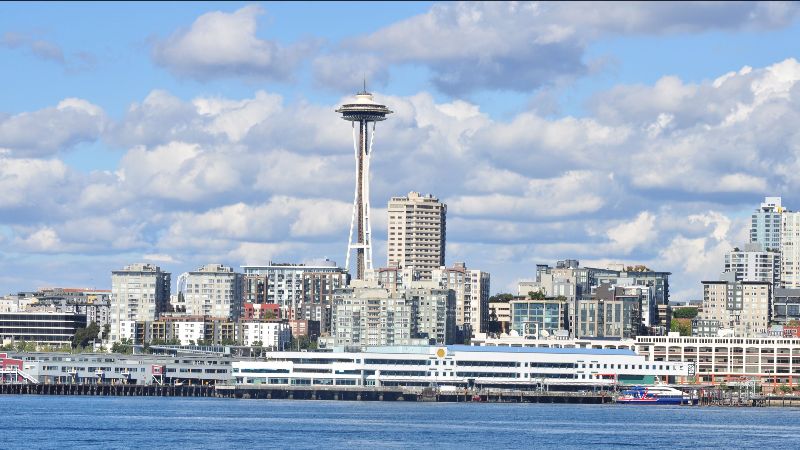Seattle
City Council will hear the new proposed Transportation Levy on Tuesday morning at 9:30 am. The Mayor released an updated draft Levy yesterday. The new proposal is slightly larger, now $1.45 billion. It has small increases in funding for walking, biking, and transit over the previous draft. It also proposes building all the new sidewalks in the first 5 years, and spending $5 million on an investigation into raising more money in the future focused on sidewalks and bridges. The new levy is likely to cost the average homewoner $41/month. Publicola notes: “Although the new levy will be larger than the Move Seattle voters passed in 2015, it will still spend less, after adjusting for inflation, on pedestrian and transit improvements than previous levies, according to an analysis by Seattle Neighborhood Greenways’ Ethan Campbell.”
The City Council unanimously approved the Seattle Transportation Plan. The Transportation Levy is expected to come before the Council next week.
The City Council voted 7-2 to reject the Equitable Housing Initiative. The proposal would have allowed non-profits and developers partnering with non-profits to build as many as 34 larger apartment buildings if those buildings included affordable housing or social services, as part of a pilot project. Affordable housing developers argued that the pilot project would make these buildings “much more financially feasible”. Tree advocates testified that there would not be enough space for trees. Councilmembers who voted no had a variety of reasons, but many said that they felt that the rents should be lower.
Seattle fell slightly in the ACEE’s Clean Energy Scorecard this year, and was rated “not on track” for reaching our community goal of 58% reduction in GHG by 2030. To be fair, none of the cities with similar climate goals are on track, except for San Francisco, which is on track for 40% reduction by 2025 compared to a 1990 baseline. The fact sheet for Seattle is here, policy list here. The report notes “Seattle was one of the strongest performers among its peers, but it fell in the rankings from the previous scorecard. Seattle performed best in the local government operations category and has the most room to improve in the buildings category.” The report includes data up to August 2023, so it does not include the new Buildings Emissions Performance Standards. Seattle was ranked #3 overall; #1 for number of actions, but #7 on energy equity policies, #6 on smart growth.
Seattle’s Office of Sustainability and Environment released a status report on the Transportation Electrification Blueprint, detailing the progress of various initiatives related to vehicle electrification. Apparently there is now inter-city electric bus service to Bellingham. And it looks like lots of work has been done on last mile freight delivery, including an e-bike program they are working on, and better management of curb space.
State
The State is preparing an EV rebate program for electric vehicles, and will pay up to $9000 for 3 or more year lease of a new vehicle, or $2500 for a purchase or lease of a used EV. The rebates are for people who make 300% or below of the Federal poverty line, and are intended for people who do not usually purchase new vehicles. This new rebate can be stacked on top of the Federal rebate from the Inflation Reduction Act, Commerce notes that this can “make leasing an EV as low as $56 a month, with at least six models available for less than $150 a month.” Coltura says that “outreach will prioritize super-commuters who drive more than 19,000 miles a year for work.” WSDOT is also working on a rebate plan for e-bikes, based on $5 million in funding, according to The Urbanist.
The Environmental Protection Agency announced $7 billion in grants as part of its Solar for All campaign under the Inflation Reduction Act, and the State was awarded $156 million to pay for rooftop solar for single family, affordable muti-family, community solar, and tribal projects. Under EPA rules, funding is for low-income and disadvantaged communities. This money will be added to the $100 million the State set aside from the Climate Commitment Act revenues for solar projects, much of it has already been awarded,
Gubernatorial candidates are backing a plan to buy diesel ferries in place (or in addition to?) hybrid ferries, according to the Seattle Times. Inslee remains committed to hybrid ferries, but candidates for Governor including democrat Bob Ferguson have signalled a willingness to go back to diesel.
The Seattle Times had a good article on HB 1589 to decarbonize Puget Sound Energy’s gas business. Joe Nguyen describes it as a “plan for a plan”, and says it allows PSE to make a plan for decarbonizing that can be paid for by ratepayers, subject to regulatory approval. The law also removes rebates for gas appliances starting next year.
Elsewhere
A new study published in Nature finds that climate change will cause an income reduction of at least 19% in the next 26 years, independent of future emission choices. These costs are six times more than decarbonization would be, and grow further over time. “Our analysis shows that climate change will cause massive economic damages within the next 25 years in almost all countries around the world, also in highly-developed ones such as Germany, France and the United States,” says Potsdam Institute for Climate Impact Research scientist Leonie Wenz who led the study. ”These near-term damages are a result of our past emissions. We will need more adaptation efforts if we want to avoid at least some of them. And we have to cut down our emissions drastically and immediately – if not, economic losses will become even bigger in the second half of the century, amounting to up to 60% on global average by 2100. This clearly shows that protecting our climate is much cheaper than not doing so, and that is without even considering non-economic impacts such as loss of life or biodiversity.”

